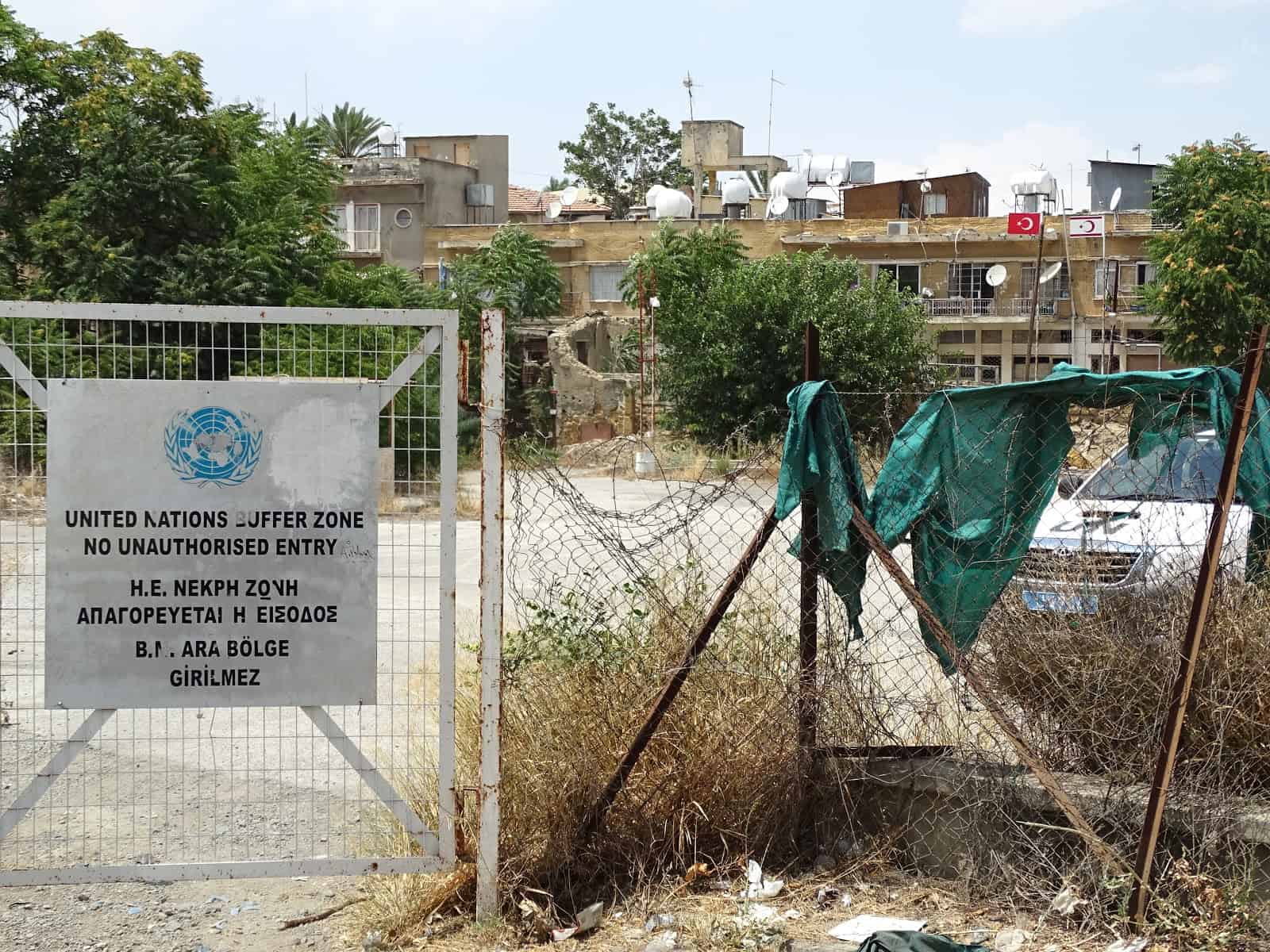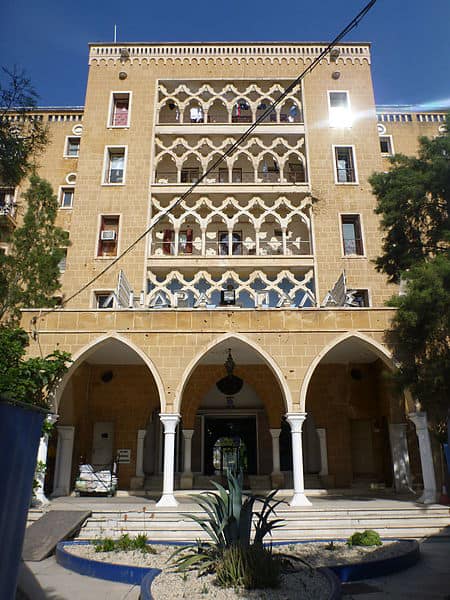Marked by broken glass, sand bags, and abandoned buildings, the Green Line dividing Nicosia is a place out of time. One hundred twelve miles across and up to 4.6 miles wide, this barren strip has divided the Greek and Turkish sectors of the small Mediterranean island of Cyprus since 1964, when UN peacekeeping forces helped quell a violent conflict between the two communities. The force remains in Cyprus to this day. Described as “Paradise with a Problem” and graveyard for diplomatic initiatives, the reunification of Cyprus has been the goal of NATO, the EU, the UN, the United States and countless individual diplomats since the establishment of the Green Line in 1964.
As a public diplomacy officer, Judith Baroody sought to bring the people of the two sectors together through a range of initiatives: public dialogues, cultural events, and exchange programs bringing young leaders to the United states. She looks back on her time in Cyprus (1996-99) with a mixture of frustration and hope. The island remains divided—but people-to-people contacts also continue. In a long Foreign Service career, this was Baroody’s favorite assignment.
Judith Baroody joined the old United States Information Agency (USIA) in 1984, and transferred to the State Department when that agency was abolished in 1999. A self-described “Arabist” who primarily served in the Middle East, Judith’s career took her to Damascus during a period of political stability and relative religious tolerance (1985-86), to Tel Aviv with the formidable Ambassador Thomas Pickering (1986-88), and to Baghdad during wartime (2008-09). Just before retirement, Baroody served as the executive director of the Association for Diplomatic Studies & Training (2015-17).
Judith Baroody’s interview was conducted by Charles Stuart Kennedy on May 4, 2016
Read Judith Baroody’s full oral history HERE.
Drafted by Lydia Laramore
Excerpts:
“We realized that Cyprus would never be a major power, so we decided to be a major nuisance instead.”
In Pursuit of Reconciliation: I had to deal with the Greek Cypriot chairman, Lellos Demetriades, who was the mayor of Nicosia and a tough-talking lawyer, and the Turkish Cypriot chairman. Lellos would take a maximalist approach to negotiations, demanding the impossible and settling for the plausible. He was also warm and funny. He once told me, “We realized that Cyprus would never be a major power, so we decided to be a major nuisance instead.”
I tried to mediate among all of them. It was actually a fairly congenial group because we all wanted the same thing, which was to find an equitable peace settlement and to provide academic opportunities for the young people of Cyprus, whatever their ethnicity. . . . Both sides were stubborn because they had a lot at stake. The problem with finding a solution during our time there was that one side would be amenable to a settlement and the other would not. Then the other side would come around and want peace, and something would happen and the first side would not. So it was not that one side was being reasonable and the other was not; it was that they were never in a position to come to a peaceful reconciliation at the same time.
“They were great, but it was as if the cosmos objected to their coming to Cyprus.”
Adventures in Public Diplomacy: We promoted federalism; we promoted economic integration. We convinced Cyprus’ only think-tank to host a conference on elements that would make up the Cyprus settlement. But we offered more traditional Public Diplomacy programming, too. For example, we hosted concerts on both sides of the Green Line. . . . Among the artists who performed there were a duo we brought in named Stephen Swedish and André Emelianoff. André played the cello and Stephen played the piano. They were great, but it was as if the cosmos objected to their coming to Cyprus.
We had put them up in the Holiday Inn in Nicosia. Two hours after they arrived on October 9, 1996, we had an earthquake of 6.4 magnitude, with an epicenter 40 miles off the southwest coast. It was a big one: 130 people were injured, buildings were damaged, and rockslides covered roads. I had not experienced an earthquake before. The Cypriots that I worked with knew what was happening. I remember standing behind my desk, and I heard what I thought was a truck rumbling nearby, a big truck on the road next to us. It got louder and I thought it must be a low-flying jet. Then one of my staff members ran in and said, “We’re having an earthquake!” I said, “Everybody get out!” So we ran out of the building and just stood there. It went on for more than 60 seconds. Everything shook and then it stopped. I was astonished because I’d never been through that before.
There was a solar eclipse before their final concert at Bellapais. Three hundred fifty Cypriots showed up and enjoyed the music so much they gave Swedish and Emelianoff thunderous applause and a standing ovation. Earthquakes, thunderstorms, floods, eclipses—whatever the weather, it was a great success.
“Then they got to know each other.”
Reaching Across the Green Line: Whenever we selected International Visitors (IVs) . . . we would identify one Greek Cypriot and one Turkish Cypriot for each program. We would insist that they travel together to the United States. We very seldom got a “no” because, after all, it’s a free trip to the United States and IVs are treated well and introduced to valuable contacts. So almost no one said, “No, I’m not going to travel with a Greek Cypriot or a Turkish Cypriot.” Then they got to know each other.
“We need rain for a good harvest. We need peace for prosperity.”
Singling and Mingling in the Rain: Dick [Judith’s husband and Special Assistant to the Ambassador for Bicommunal Affairs] was able to set up a bicommunal fair in the Buffer Zone on the grounds of the Ledra Palace that brought together 2000 Cypriots on September 27, 1997. . . . The goal was to inform Cypriots about the breadth of bicommunal activities going on and to encourage them to join in. . . . On the morning of the fair, it started to drizzle—this at a time of drought. This festival was supposed to start at 4:00. By 10:00 o’clock, it was a torrent. We had worked on this thing for so long, and we thought, “Nobody’s going to come.”
But in spite of the rain, people began pouring in, first from the Turkish Cypriot side and then from the Greek Cypriot side. By the end we had a couple of thousand people there in the rain, enjoying hot dogs and pony rides. People were so happy to be with their families and meet with Cypriots from the other side. We were singing and mingling in the rain.
Cypriot and Turkish TV and print media covered the fair and the Voice of America featured a story about it on VOA’s Greek and Turkish services. The rain let up an hour before the end of the fair, giving way to a cool, clear evening. Someone said, “We need rain for a good harvest. We need peace for prosperity.” It was an iconic event, one that started a tradition that has continued to this day.
“My job as Public Affairs Officer was not so much to get the big guys to talk to each other . . . . My job was the prepare the populations for peace.”
Preparing Populations for Peace: My job as Public Affairs Officer was not so much to get the big guys to talk to each other. . . . My job was to prepare the populations for peace. Public Affairs offices work more with people face-to-face, especially with centers of influence such as educators and journalists. Our job was to try to build grassroots support on both sides for reconciliation so that when the political decision-makers finally came to a peaceful solution, the population would be ready to accept it.
We’ve stayed in touch with friends from both the Greek Cypriot and Turkish Cypriot communities and cherish those friendships. Every officer arriving in Nicosia thinks the two sides are going to come to peace during their time at post. I hope and pray there will soon be peaceful reconciliation in Cyprus and a just resolution to the division of the island.
TABLE OF CONTENTS HIGHLIGHTS
Education
BA in Modern Languages, College of William and Mary 1972-1975
MA in Foreign Affairs, University of Virginia 1983–1985
Joined the Foreign Service 1984
Damascus, Syria—Assistant Information Officer 1985–1986
Tel Aviv, Israel—Assistant Information Officer 1986–1988
Casablanca, Morocco—Branch Public Affairs Officer 1993–1995
Nicosia, Cyprus—Public Affairs Officer 1996–1999
U.S. Embassy Baghdad—Senior Adviser, Rule of Law Office 2008–2009
U.S. Embassy Paris—Minister-Counselor for Public Affairs 2009–2011


